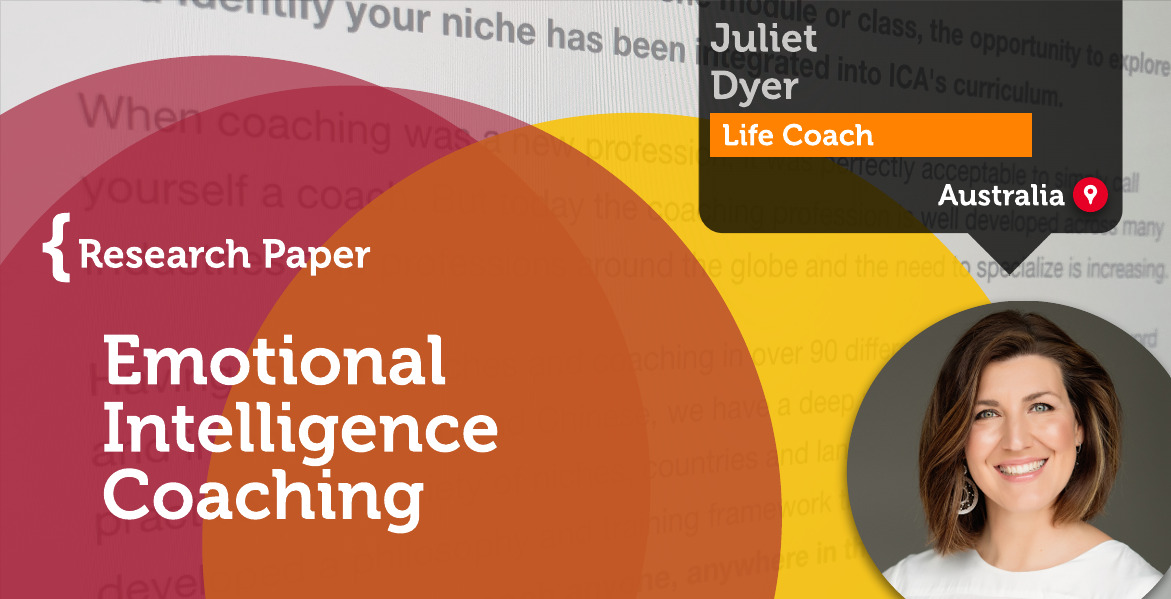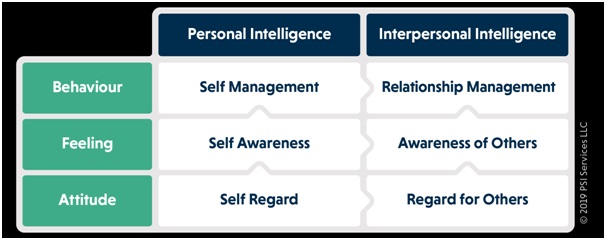A Research Paper By Juliet Dyer, Life Coach, AUSTRALIA

We are emotional beings, and as such emotions play a part in pretty much everything we do. Having an understanding of how our emotions impact our daily lives puts us in a position to be in control of our attitudes, feelings and behaviour. Thus, emotionally intelligent people can think their way through emotion rather than be managed by their emotions. In this paper, I will be exploring firstly what Emotional Intelligence is and the benefits of Emotional Intelligence Coaching.
What Is Emotional Intelligence?
The term Emotional Intelligence became a mainstream word in 1996 when Daniel Goleman, an internationally known psychologist, lecturer, and writer wrote his book “Emotional Intelligence.” The success of Goleman’s book popularised the term EI, but it was John Mayer and Peter Salovey who first introduced it in 1990. These two university professors were researching how to scientifically measure the difference between people’s abilities, about their emotions, and together they wrote a paper entitled “Emotional Intelligence.” In this paper, they defined Emotional Intelligence as:
Form of social intelligence that involves the ability to monitor one’s own and others’ feelings and emotions, to discriminate among them, and to use this information to guide one’s thinking and action.[1]
To be considered emotionally intelligent requires two elements of intelligence:
1) be aware of what’s going on inside of you (Self Awareness) and be able to take appropriate action to manage and control your own emotions (Self Management)
2) be aware of and understand other people’s emotions (Awareness of Others) and be able to take appropriate action to manage them (relationship management).
Howard Gardner defines these two elements as intrapersonal intelligence and interpersonal intelligence.[2]
Emotional Intelligence at the Attitudinal Level
Tim Sparrow and Jo Maddocks further explored this and other EI models and together developed their own unique Emotional Intelligence Profile (EIP)[3] and Assessment that looks at EI at the attitudinal level. Through their research, they discovered that the extent and effectiveness by which individuals are emotionally intelligent is largely determined by our attitudes.[4] Attitudes can directly drive behaviour often bypassing conscious awareness of feeling. Changing behaviour is often short-lived if it is not supported by a parallel change in attitude.
Due to the popularity of EI, over the years many different types of EI frameworks/models have been created and many of them look at EI as a set of competencies; being behaviours and skills. In contrast, the EIP framework is underpinned by attitudes and feelings.
As shown in the table below, the EIP framework looks at how a person manages their behaviour and relationships and is broken down into 3 levels: Attitude, Feeling and Behaviour.
 Figure 1.0 3
Figure 1.0 3
The attitudinal level determines the degree to which you value and accept yourself (Self Regard) and the degree to which you value and accept others (Regard for Others). This is the deepest level as a person’s attitude (mindset) influences their thoughts and feelings which in turn drives their behaviour.
The feeling level looks at how you manage your feelings and others. It looks at the relationship between thoughts, feelings and behaviour.
The behaviour levels about your behaviour and your relationships. Self Management is about coping with setbacks, self-motivation levels and your ability to adapt to change. The Relationship Level is about trusting others, managing conflict and working as part of a team.
Metaphorically a great way to explain this model and the importance of the attitudinal level is to describe it as the legs of a table. Imagine the top four boxes at the Behaviour and Feeling levels represent the four legs of a table and the Attitudinal level represents the ground. If the ground is flat and smoothes your table is balanced. If the ground is bumpy or uneven, the table will be out of balance.
This metaphor demonstrates the importance of EI and having a strong foundation, as each area builds into the next. If an individual feels bad about themselves and are self-critical (low self-regard) then they are more likely to be critical of others (low regard for others). This in turn impacts the feeling and behaviours sections.
Why Emotional Intelligence Coaching?
Feeling emotions are part of who we are, but when our actions as a result of our emotions are causing havoc in our lives, it can be a major problem. People who have a low EI are often more reactive than responsive and they tend to display the following attitudes and behaviours[5]:
- They always have to be right
- They are oblivious to other people’s feelings
- They behave insensitively
- They blame others for their problems
- They have poor coping skills
- They have emotional outbursts
- They struggle with relationships
- They turn conversations towards themselves
In contrast, emotionally intelligent people can think their way through emotion rather than be managed by their emotions and are then able to manage their behaviour accordingly. They are highly aware of their feelings and behaviours and other people’s feelings and behaviours. They have positive regard for themselves and others. What’s so great about this is Emotional Intelligence can be improved and that’s where coaching comes in.
The benefits of developing your Emotional Intelligence are[6]:
- Improved relationship
- Improved communication skills
- Improved work performance
- Improved empathy skills
- Ability to respect others and be respected by others
- Open to change
- The overall increase in confidence and positivity
- Reduced stress levels
- Increased creativity
- Ability to reflect and learn from your mistakes
The EI Coach
To be an effective EI Coach it is vital that the coach demonstrate a high level of EI and has an attitude of “I’m ok, you’re ok.” An EI Coach should be able to demonstrate a high level in all areas of the framework listed above. This allows the coach to be very present with their client, to have great listening and communication skills, to be able to demonstrate empathy and hold a place of non-judgement for their clients. Daniel Goleman says:
“Great coaches apply emotional intelligence throughout their work: They remain calm in difficult situations, with emotional balance. They rely on empathy to understand their clients’ perspectives and give on-target, individualized feedback.”[7]
The Use of EI Assessments
Many EI Assessments have been developed over the years based on the different EI Frameworks created. The benefit of using an EI assessment is it gives the client and coach a starting point regarding the current level of EI someone has and can then be used to explore the areas of development that are highlighted within the report.
The assessment tool I will be exploring in this paper is the Emotional Intelligence Profile (EIP3), developed by Maddox and Sparrow that is based on the framework earlier discussed in this paper. The EIP3 measures a person’s current level of EI and provides a starting point for the client to develop a more emotionally intelligent approach to work and life in general.
This assessment follows the underlying principle, mentioned earlier that emotionally intelligent behaviour, thoughts, and feelings are underpinned by emotionally intelligent attitudes. Therefore, to achieve lasting change and sustainable performance, it is necessary to develop emotionally intelligent attitudes.
As previously mentioned there are 6 key parts of the EIP Framework and this is further broken down into 16 scales within the EIP3 assessment4.
Attitude Scales
- Self Regard is the degree to which you accept and value yourself.
- Regard for Others is the degree to which you accept and value others as people.
Feeling Scales
- Self Awareness is the degree to which you are in touch with your body, feelings and intuition.
- Awareness of Others is the degree to which you are in touch with the feelings of others.
Behaviour Scales
- Emotional Resilience is the degree to which you can pick yourself up and bounce back when things go badly for you.
- Personal Power is the degree to which you believe that you are in charge of and take responsibility for your outcomes.
- Goal Directedness is the degree to which your behaviour is related to your own long-term goals.
- Flexibility is the degree to which you feel free to adapt your thinking and your behaviour to match changing situations.
- Connecting with Others is the extent and ease with which you can make significant connections with other people.
- Authenticity is the degree to which you invite the trust of others by being principled, reliable, consistent and known.
- Trust is your tendency to trust others but to the right degree.
- Balanced Outlook is how well you manage to balance optimism and realism.
- Emotional Expression and Control is how well you balance emotional expression with emotional control.
- Conflict Handling is how well you handle conflict or how assertive you are.
- Interdependence is how well you manage to balance taking yourself and taking others into account.
- Reflective Learning is the extent to which you reflect on what you and others feel, think and do and alter your behaviour accordingly.
Coaching With the EIP3 Assessment
When coaching with this assessment, fundamentally, it is the client lead. When it comes to showing a client the results of their assessment it should be referred to as an exploration session, not a feedback session. A feedback session implies judgement and that you are telling the client how they are, whereas an exploration session allows for curiosity and reflection and is client lead. The coach uses their expertise and training to navigate the client through the profile asking questions that open the client up to reflection, such as:
- What do you find interesting about these results?
- Does anything stand out to you?
- Are you surprised by what you see?
- What area would you like to explore?
- What does this mean for you?
- In what situations do you feel this attitude/behaviour may play out?
- What are your thoughts and feelings on this?
It should be noted this assessment can only be used by coaches that are certified to do so. Understanding how our emotions impact our daily lives puts us in a position to be in control of how we show up in any given situation. It gives an individual the ability to look at where they are in life, take ownership of that position and make changes to move towards a richer and fuller life. By being aware of and in control of your attitudes, feelings and behaviours move a person from being reactive to responsive. Building emotional intelligence is not something that suddenly happens overnight, it takes discipline, self-kindness and ongoing reflection. But, when you put all of this together it leads an individual to a successful and vibrant life.
References
[1]Riopel, L.Positive Psychology
[2]Gardner, H. (n.d.). Multiple Intelligences Oasis
[3]Emotional intelligence profile
[4]Maddocks, J Emotional Intelligence At Work How To Make Change Stick, Spa House Publishing, Cheltenham, Gloucestershire, UK.
[5]Signs of low emotional intelligence
[6] Neale, S., Spencer-Arnell, L., Wilson, L. Emotional Intelligence Coaching; Improving Performance for Leaders, Coaches and the Individual, Kogan Page, London
[7]Work with emotional intelligence